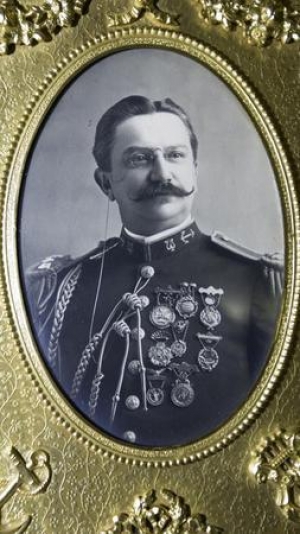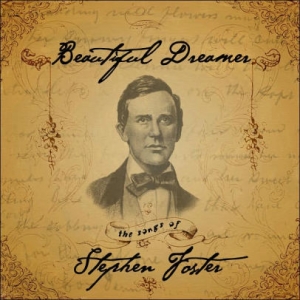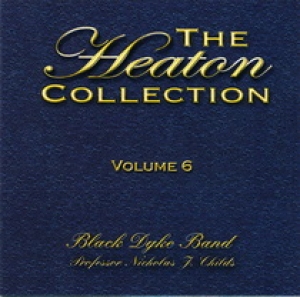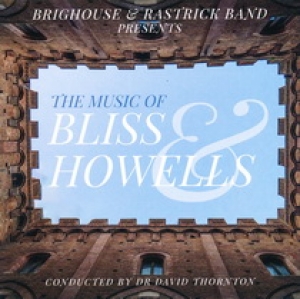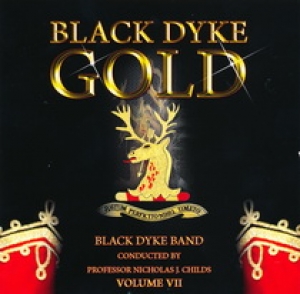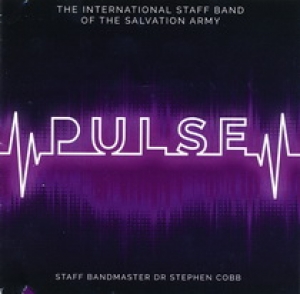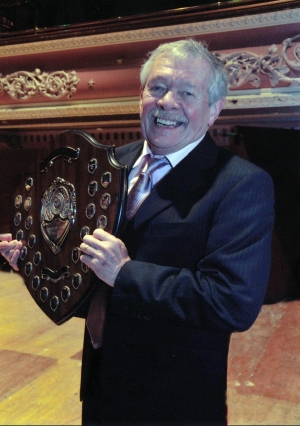
Talk Subjects
Chris Helme
Walter Paul "Woody" English (1867-1916) was an American tuba player and band composer. He was born in Salt Lake City, Utah in 1867. He grew up in Dallas, Texas playing tuba in various bands. In 1891 he joined a circus band and in 1892 he joined the band on the McMahon Circus. During the next three years he travelled with various circus bands.
He played tuba in Carl Clair's band for the European tour of Barnum & Bailey's Greatest Show on Earth at the turn of the century (1897-1903). He took up the conducting in 1907. In 1909 he played for Norris & Rowe (Smith). English spent three years with the Sells-Floto Circus. In 1913, he played tuba for The Girl of Eagle Ranch production, thereafter rejoining Sells Floto. Karl King and English subsequently co-authored a march, 'Howdy Pap'.
He died in Denver, Colorado in 1916. In 1984, English was elected to the (Circus Band) Windjammer's Hall of Fame.
On this week's show we feature what is recognised as his most famous march 'Royal Decree' played by the Sun Life (Stanshawe) Band MD: Roy Newsome - originally recorded in 1979.
Charles A. Zimmermann (1861 – 16 January 1916) was an American composer of marches and popular music. A graduate of the Peabody Conservatory of Music in Baltimore, he was appointed bandmaster at the United States Naval Academy in 1887 at the age of 26. He served as the Academy's bandmaster until his death from a brain hemorrhage in 1916. He is buried at the Naval Academy cemetery.
Zimmermann composed his most famous march, "Anchors Aweigh", in 1906 when he was a Lieutenant in the United States Navy. The lyrics were written by Alfred Hart Miles, a midshipman. The march was intended from the beginning to serve as a rousing tune for football games. The familiar strain is actually the trio (third movement) of the larger work. Zimmermann also composed numerous songs for the 1902 stage play The Wizard of Oz.
In this week's show we feature 'Anchors Away' played by the GUS (Footwear) Band MD: Stanley Boddington in 1968.
Enjoy the show
Stephen Collins Foster (July 4, 1826 – January 13, 1864), known as ‘the father of American music’, was an American songwriter known primarily for his parlour and minstrel music. He wrote more than 200 songs, including ‘Oh! Susanna’, ‘Hard Times Come Again No More’, ‘Camptown Races’, ‘Old Folks at Home’ (‘Swanee River’), ‘My Old Kentucky Home’, ‘Jeanie with the Light Brown Hair’, ‘Old Black Joe’, and ‘Beautiful Dreamer’, and many of his compositions remain popular today. He has been identified as ‘the most famous songwriter of the nineteenth century’ and may be the most recognisable American composer in other countries. His compositions are sometimes referred to as ‘childhood songs’ because they have been included in the music curriculum of early education. Most of his handwritten music manuscripts are lost, but editions issued by publishers of his day can be found in various collections
He was born on July 4, 1826, to William Barclay Foster and Eliza Clayland Tomlinson Foster, with three older sisters and six older brothers. His father was of Ulster Scots descent. He attended private academies in Allegheny, Athens, and Towanda, Pennsylvania and received an education in English grammar, diction, the classics, penmanship, Latin, Greek, and mathematics. The family lived in a northern city, but they did not support the abolition of slavery.
He taught himself to play the clarinet, violin, guitar, flute, and piano. He did not have formal instruction in composition, but he was helped by Henry Kleber (1816–97), a German-born music dealer in Pittsburgh. In 1839, his brother William was serving his apprenticeship as an engineer at Towanda and thought that Stephen would benefit from being under his supervision. The site of the Camptown Races is 30 miles (48 km) from Athens and 15 miles from Towanda. His education included a brief period at Jefferson College in Washington, Pennsylvania, now Washington & Jefferson College. His tuition was paid, but he had little spending money. He left Canonsburg to visit Pittsburgh with another student and did not return.
In 1846, Foster moved to Cincinnati, Ohio, and became a bookkeeper with his brother Dunning's steamship company. He wrote his first successful songs in 1848–1849, among them ‘Oh! Susanna’, which became an anthem of the California Gold Rush. In 1849, he published Foster's Ethiopian Melodies, which included the successful song ‘Nelly Was a Lady’ as made famous by the Christy Minstrels. A plaque marks the site of his residence in Cincinnati, where the Guilford School building is now located.
Then he returned to Pennsylvania and signed a contract with the Christy Minstrels. It was during this period that he wrote most of his best-known songs: ‘Camptown Races' (1850), ‘Nelly Bly’ (1850), ‘Ring de Banjo’ (1851), ‘Old Folks at Home’ (known also as ‘Swanee River’, 1851), ‘My Old Kentucky Home’ (1853), ‘Old Dog Tray’ (1853), and ‘Jeanie with the Light Brown Hair’ (1854), written for his wife Jane Denny McDowell.
Many of Foster's songs were of the blackface minstrel show tradition popular at the time. He sought to ‘build up taste among refined people by making words suitable to their taste, instead of the trashy and really offensive words which belong to some songs of that order’. Many of his songs had Southern themes, yet Foster never lived in the South and visited it only once during his 1852 honeymoon.
His last four years were spent in New York City. There is little information on this period of his life, although family correspondence has been preserved.
Foster became ill with a fever in January 1864. Weakened, he fell in his hotel in the Bowery, cutting his neck. His writing partner George Cooper found him still alive but lying in a pool of blood. Foster died in Bellevue Hospital three days later at the age of 37. Other biographers describe different accounts of his death.
When Foster died, his leather wallet contained a scrap of paper that simply said, 'Dear friends and gentle hearts', along with 38 cents in Civil War scrip and three pennies. The note is said to have inspired Bob Hilliard's lyric for "Dear Hearts and Gentle People" (1949). Foster was buried in the Allegheny Cemtery in Pittsburgh. After his death, Morrison Foster became his ‘literary executor’. As such, he answered requests for copies of manuscripts, autographs, and biographical information. One of the best-loved of his works was ‘Beautiful Dreamer’, published shortly after his death.
Black Dyke Band
MD: Professor Nicholas Childs
With the Sheffield Philharmonic Chorus and conductor Darius Battawalla
Doyen Recording: DOY CD385
It was announced that on Sunday, February 3, Stuart Fawcett passed away after a short illness. He was 76.
Stuart has been a stalwart in the brass band movement for over 65 years, particularly in the West Yorkshire area.
Talks Available
All the presentations are timed to last up to an hour except where shown - questions are gladly taken after the presentation. All have been presented to male, female and mixed audiences of varying age groups.
-
A Postcard from the Past
The Sunny Vale Pleasure Gardens, Halifax - Yorkshire’s Alton Towers of the…
-
All in a Days Work
Reminiscences from 30 years in the Police Service – (humorous lecture presentation)…
-
Legends from the world of Brass Bands
(Info-tainment – digital slides & music) – 1 hour presentation.
-
A Week in May
A story based on the Murder of Lord Frederick Cavendish (of the…
- Memories of Christmas Past
-
The Road to Publication
In 1979 I was asked to assist in presenting a series of…
-
How we used to live
We have all seen and experienced changes in our lives. Bring back…
- Holiday Memories from the Past
-
Other Folks Rubbish (Not suited to a Zoom presentation)
With a local history theme… – (thought provoking humorous lecture presentation) –…
- So you want to be a Pirate ? - The life of a Pirate was not all that it seemed
- Superstitions, New Year Resolutions and the Origins of St Valentine's Day
- Brighouse at Work
-
Sorry but I am not able to accept any more face to face talk bookings at the present time ONLY ZOOM TALKS



